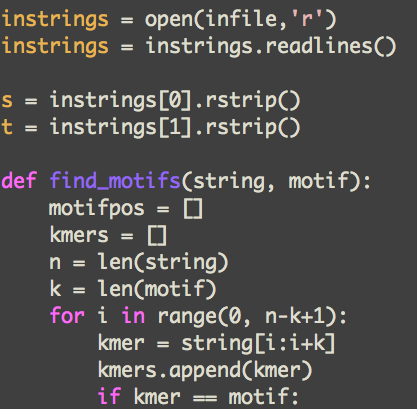There is no specific text for this course. Rather, we will be using resource materials available online:
- For the Python component of the course, we will be using the Hands-on Python Tutorial designed specifically for this course by Loyola Professor Andrew Harrington. It is available on the web, both in browsable format and in printable pdf format. This is the closest thing that we have to a text for this course.
- Example files are referenced in the tutorials, and you may download them here.
- Videos, where most all of the course content are discussed, have download links on box.com as well as google. These were also prepared by Professor Harrington. You can find links and instructions here.
- Class Notes for other course components are linked to from the Course Schedule.
Other Free Online Resources for Python
All except the official Python Tutorial are intended for people with no programming background.
- How to Think Like a Computer Scientist Covers the same basics as the Hands-on Python Tutorial, but in online book form, to greater depth in a somewhat different order with a different simple graphics library. The latest version is for Python 3.X. You can run programs online and edit code in the text.
- Software Carpentry is a Python-centered introduction to many subjects, many beyond this course, but not far off. The sections that do largely correspond to the Python tutorials are the ones through Functions. They list more methods than the Hands-on Python Tutorial, but with rather limited examples.
- Official Python Tutorial for version 3.6 covers a lot. It moves fast for someone with no programming background. Idle links to this.
- Wikibooks Non-programmer Tutorial for Python Another introduction to Python basics in different words. No graphics, few major examples, lots of basic syntax.
- One notable resource for testing Python code out is for http://www.pythontutor.com/. You run code in your browser step by step and save and email a URL reference to any step.
- Other Python resources are at the home site for Python: https://www.python.org.
Free Tutoring Assistance
- Computer Science Department:
- Department Drop-in Tutoring Schedule: http://www.luc.edu/cs/schedules/tutoringhours/.
- Tutoring hours by Computer Science TAs (generally first-come-first-serve) should start by the second or third week of the semester.
- All tutors should be familiar with most of the course topics. If any tutors you visit are NOT familiar with Python, let me know right away.
- The university supports an official Tutoring Center in the Sullivan
Center.
- Their phone extension is 8-7708. Their web site is http://www.luc.edu/tutoring.
- You may need to make appointments in advance for university tutoring. When consulting the university tutoring center hours, remember that, at most, tutors for COMP 150 are only available during some of those times, due to the personal schedule of the tutors. In general, COMP students have done better with the department’s tutoring service.
Office Hours
Instructor office hours will be held Tuesdays from 9:30 - 11:15 AM in my office Doyle 304. To meet at a time other than this, you must email me at hwheeler1@luc.edu to schedule a day and time in advance; I cannot meet with students that just “drop by”. I will do my best to respond to emails within 24 hours. For homework help, I encourage use of Computer Science Department tutors (see above), they are excellent. You may also email the TA, Thomas Hatzopoulos thatzopoulos@luc.edu, with questions. When you encounter a problem, error message, etc., you can always try and Google it!
